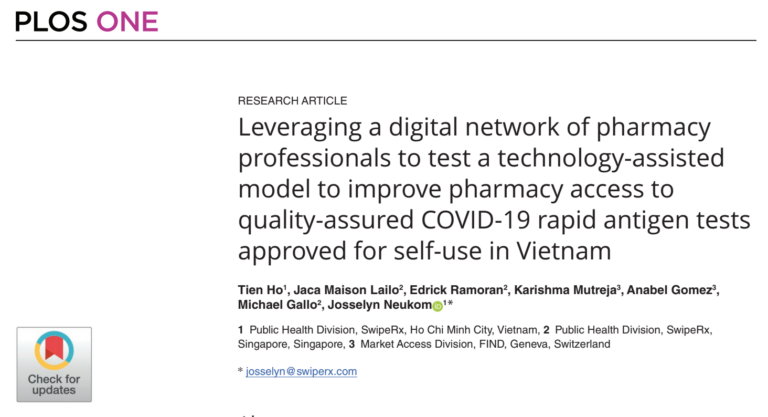While many industries are able to continue working from home, there’s one industry that can’t – the healthcare industry. The pharmacy network, healthcare clinics and hospitals all remain open. Everyday, healthcare workers are on the front line battling infectious disease management and trying to maintain their patients medication adherence, and they depend on personal protection equipment (PPE) to keep them safe.
However, as healthcare professionals are committed to ensuring patient adherence and safety, they are still at the front line engaging with patients who are potentially infected by COVID-19. That’s why face masks (such as N95 and FFP3 masks), goggles, and face shields are critical. But, as the pandemic continues to escalate, the World Health Organisation (WHO) has alerted the public of a worldwide shortage of protective medical equipment.
WHO estimates that 89 million masks, 76 million pairs of gloves, and 1.6 million pairs of goggles are needed every month by healthcare workers and has encouraged countries and companies to increase production by 40% to meet the increasing demand.
mClinica Pharmacy Solutions urges the public to support the pharmacy network and healthcare providers by spreading the news of these four increasingly common scenarios below:
1. Hoarding and misuse on the rise
In a press conference in Geneva, the Director-General from WHO, Tedros Adhanom Ghebreyesus expressed concerns over the increasing disruption to the global supply of personal protective equipment caused by hoarding and misuse. He reminded the public that the ability to respond to COVID-19 is compromised if we cannot protect health workers.
The rise of hoarding and misuse is also widely spoken about across the pharmacy network in Southeast Asia. Many pharmacists have discussed on our pharmacy mobile app, SwipeRx how they have had to learn how to calm nervous customers who are desperately looking for more face mask supplies, and encourage them not to buy more than they need. In Malaysia, pharmacists have also claimed they are not able to stock up on face masks. After seeing double the usual demand, U Pharm community pharmacy operations told The Straits Times she was not able to get from suppliers for weeks, and suppliers also cannot get them from local manufacturers. This report was made two weeks after the Domestic Trade and Consumer Affairs Minister requested local manufacturers to increase their production by 400,000 pieces daily. The Malaysian Pharmaceutical Society president has said that sub-rural and rural areas have dried up completely as a result of panic buying.
2. Increasing price exploitation
The overwhelming demand for protective equipment has also led to the unfortunate side-effect of price gouging. Due to the mass panic in many countries, the rise of bulk-buying, and the natural laws of demand and supply, many sellers have chosen to increase prices.
Since the coronavirus outbreak, several sources have cited that the prices of protective gowns have doubled, prices of N95 respirators have tripled, and prices of surgical masks have skyrocketed. WHO also reports that the production backlog has caused prices of some PPE items to go up as much as 20 times.
Across the pharmacy network in Southeast Asia, many pharmacists have tried to increase their orders to minimise price exploitation. However, with more patients visiting pharmacies to buy protective equipment, just as much as they are to fill their prescriptions, the minute these are put on the shelves they are quickly sold. In Malaysia, it’s been reported that local manufacturers also prefer exporting face masks overseas to China, Hong Kong and Singapore where they are able to charge higher prices and the president of Malaysian Pharmaceutical Society has urged manufacturers to stockpile masks for local needs.
3. Theft on the rise
The increase of hoarding has resulted in price increases, and price increases have resulted in an increased occurrence of theft globally. Across Asia there have been an influx of reports of masks being stolen from hospitals, supply routes, and even cars. In Japan, 6,000 surgical masks were reportedly stolen from a hospital and in Malaysia, a 26-year old cleaner was suspected to steal 30 boxes of face masks worth RM 3,000.
Price gouging and panic buying has also gotten so bad that many people have even fallen victim to scam sellers purportedly selling cheap masks and hand sanitizers. In Singapore, The Straits Times reported that at least 600 people fell victim to an online scam after the prices of masks had increased 7-fold. In total, SGD 189,000 was paid for face masks that were not delivered.
4. Expired face masks and respirators in use
In Canada, nurses have complained about being provided expired face masks and respirators to meet ever-increasing demand. In Iran, which has one of the highest number of fatalities outside of China, insufficient respirators and ventilators used to treat severe COVID-19 cases have already caused multiple patient deaths.
However, in Singapore, CEO of Temasek Holdings, Ho Ching, has reached out to the public urging that the expiration dates are a general recommendation and highlights that they can still be of effective use, depending on how they have been stored. She explained that sampling tests can be performed to check the conditions to see if it is still usable and suggested that since they deteriorate over time, 70% performance is still better than no face mask. The Centers for Disease Control and Prevention and NIOSH also released a list of N95 masks that are deemed acceptable to use past their expiry date.
mClinica Pharmacy Solutions urges the pharmacy network, healthcare providers and the general public to visit The Centre for Disease Control and Prevention and NIOSH to see a list of N95 respirators that can be used past their expiry date to ensure no masks are going to waste.
The solution – accelerate production
If hoarding, price gouging and theft continues, the only foreseeable way to meet the increasing demands and protect healthcare workers is to ramp up production.
WHO has already shipped half a million sets of PPE to 27 countries to assist in the fight against COVID-19, but warns that its supply is rapidly depleting. They estimate that supplies will need to be increased by at least 40% in order to meet global demand, and they are already working with governments and manufacturers in the Pandemic Supply Chain Network to boost medical equipment production.
But this will take time. Several US companies with manufacturing facilities in China have been adversely affected by the pandemic due to quarantines, and China controls a lot of the raw materials – including fabric and plastics – necessary for producing essential medical equipment including N95 respirators and surgical masks.
Even with China’s mask production rate which is reported by South China Morning Post at 100 million masks every day, the lack of efficient global distribution has left some countries out of the loop. Making matters worse, many countries including Taiwan, India, Thailand, South Korea, Indonesia, Russia, and Germany have banned the export of masks which is blocking the flow of face masks around the world.
Thankfully, the global supply chain has been swift to pivot, with many companies like 3M and Sharp, as well as non-medical-equipment-producing companies like Foxconn, an Apple iPhone manufacturer, and the company behind China’s J-20 stealth fighter jets stepping up to improve production lines. Gaming hardware manufacturer Razer also recently joined the fight, converting existing manufacturing lines to produce surgical masks with plans to donate up to 1 million masks worldwide.
Until the impact of these production efforts are felt it’s critical that more people are aware of the disastrous effects of a lack of medical equipment. When it comes to infectious disease management, inadequate medical equipment has dangerous consequences for the pharmacy network, as well as doctors, nurses, and front line hospital staff.
During this time, mClinica Pharmacy Solutions is actively supporting pharmacists, healthcare providers, pharmaceutical manufacturers, consumer health groups and the public sector with digital patient assistance programs, and online pharmacy support tools that minimise the risk of infection that frontline healthcare workers are exposed to while they prioritize medication adherence, and patient engagement. If you would like to find out more about how our mobile health solutions can help prevent the spread of COVID-19 contact us here.
You might be interested in:
Coronavirus – How Southeast Asia is preventing a pandemic effect







